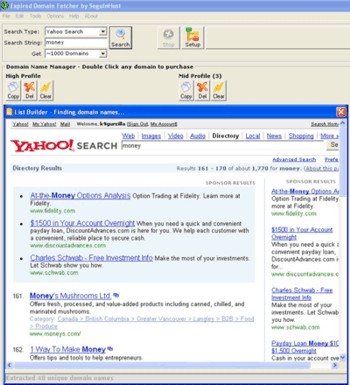Huge Profit In Domain Names
by Jeff Hansel
Dear Internet Entrepreneur, If you're ready to discover the best kept money-making secret on the Internet and find out how you can join a select insider group that's consistently raking in monster profits using a simple, repeatable process, then take 7 minutes to read this letter carefully because we're going to open your eyes to some amazing facts.
You might have seen the articles published in the Wall Street Journal or Business 2.0 magazine about how a few people (we call them "domain profiteers") are making fortunes from investing in Internet domains and either holding them for passive income or reselling them for huge profits .
Forget condos and strip malls. Domain names, the real estate of the Web, have been delivering far greater returns." "Parked domains may become a billion-dollar industry, both for paid search operators like Google and Yahoo as well as a new breed of Internet real estate developers." Internet domain names are a hot commodity again. But unlike the 1990s, when speculators bought up Web addresses in hopes of reselling them later for a big payday, many of today's purchases are aimed at cashing in on the boom in online advertisingThe domain name is 21st century real estate," says Warren Adelman, president of GoDaddy.com, the world's largest domain name registrar, with 12.9 million.
"The economy is being increasingly driven by the Internet sector"
Richard Rosenblatt is a brilliant Internet entrepreneur. You may not know his name, but he's sold $1.3 billion dollars of Internet companies including iMALL which he founded, ran and sold for $565 million, and MySpace which he turned around as Chairman and sold for $580 million.
He's a smart guy who has made a huge fortune on the Internet and even he didn't know anything about this for a long time. But now that he's discovered this opportunity, he's completely focused on turning this into his biggest business yet. He's raised and invested hundreds of millions of dollars in this. But the most amazing thing is that you and I can not only compete with... and beat... the huge players like Rosenblatt's company, but the big boys are actually part of the driving force that will help you and I to make huge money.
There's 2 simple reasons for this. First, the multi-million dollar guys are not paying attention to bargain hunters like us. They don't have the time to worry about finding cheap domains for a few bucks even if they're really worth thousands of dollars. They want bigger investments to put all that cash to work.
Which brings me to the 2nd reason. When you're ready to sell your domains for the true market value, it's those big company guys who are the primary buyers and they're the ones driving up the value for everybody! If you're not excited by now, you might want to grab a mirror and see if you've got any breath coming out to fog it up.
Don't just sit on your butt and watch other people go out and start raking in the big bucks with these domains. Don't let this be another opportunity that you let slip through your fingers like those old guys who reminisce about how they could have bought some farmland in the good ol' days for a few hundred dollars an acre years back. Then, they could have been the ones to sell that land to the mall developer for millions of dollars!
Think about this... these are the good ol' days that people will be looking back to in 5 or 10 years and talking about how smart someone was who purchased this or that domain that's now enormously valuable!
To get all the information on this extremely profitable system just Click Here!.
About the Author
Article By Jeff Hansel, Fellow Internet Entrepreneur Feel free to use this article on your website or ezine as long as the following information about author/website and or all links are included.
http://www.ebookxtra.com






